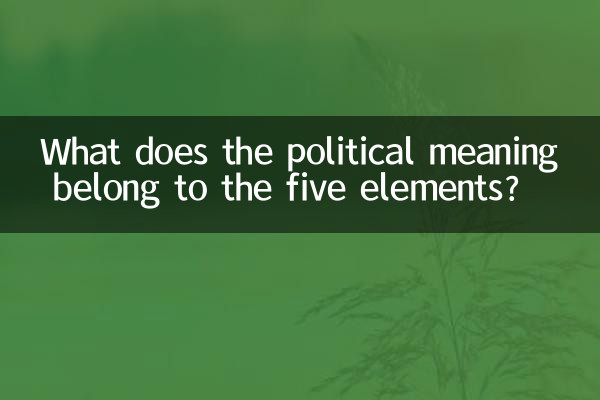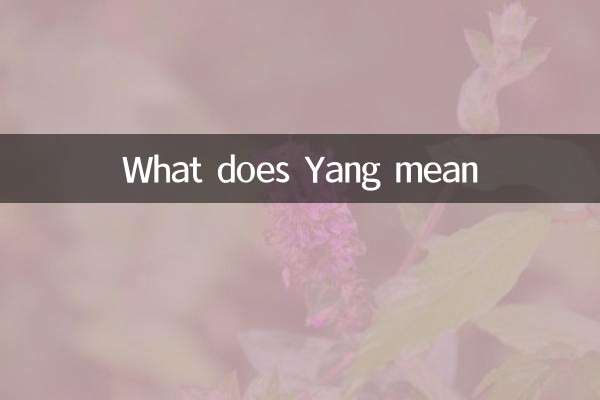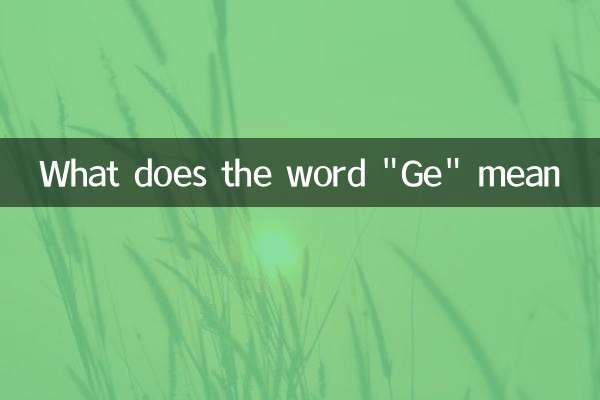What does the political meaning belong to the five elements?
In recent years, the application of the theory of the Five Elements in the political, cultural and social fields has gradually become a hot topic. As an important part of Chinese traditional culture, the five elements (metal, wood, water, fire, and earth) are not only reflected in philosophy and medicine, but are also extended to the fields of politics and management. This article will discuss "What does politics mean in the five elements" based on the popular topics and hot contents of the entire network in the past 10 days, and display relevant views through structured data.
1. The relationship between the five elements and politics

The theory of the Five Elements believes that all things in the world are composed of five basic elements: metal, wood, water, fire and earth. They are mutually generated and restrained and maintain dynamic balance. In the political field, the five elements are used to metaphorize different governance styles and strategies:
| Five Elements Attributes | Political meaning | Representative person or event |
|---|---|---|
| gold | Symbolizes for fortitude and decisiveness, and represents the rule of law and discipline | Recent topics of judicial reform |
| Wood | Symbolizes growth and development, representing innovation and reform | Discussion on scientific and technological innovation policy |
| water | Symbolizes flexibility and tolerance, representing diplomacy and coordination | Hot topics in international relations |
| fire | Symbol enthusiasm, change, and represent revolution and mobilization | Social movement related news |
| earth | Symbolizes stability and inclusiveness, representing people's livelihood and infrastructure | Rural revitalization policy |
2. Analysis of the corresponding analysis of popular topics and the five elements across the entire network
Through the review of popular topics on the entire network in the past 10 days, we can find that many hot contents are highly consistent with the five elements attributes:
| Hot Topics | Five Elements Attributes | Popularity index |
|---|---|---|
| Judicial reform in a certain country has caused controversy | gold | ★★★★☆ |
| Global Artificial Intelligence Development Summit | Wood | ★★★★★ |
| Progress made in multilateral diplomatic talks | water | ★★★☆☆ |
| Protests in some places are escalating | fire | ★★★★☆ |
| New policies for rural infrastructure construction | earth | ★★★☆☆ |
3. Practical application of the five elements political concept
In modern politics, the theory of the Five Elements provides a unique analytical framework. For example:
1.Golden Politics: Emphasize the rule of law and order. The recent measures by many countries to strengthen legislation and regulate technology giants are in this category.
2.Wooden Politics: Focus on innovative development, such as competition among countries in the fields of new energy, quantum computing, etc.
3.Water-type politics: Embodied in diplomatic mediation, several recent international mediation talks have demonstrated the flexibility of "water".
4.Fire Politics: Social movements and political changes often have the characteristics of "fire", such as the wave of protests in some areas.
5.Earth-type politics: Basic people's livelihood construction has always been the foundation of political stability, and the rural revitalization policies of various countries have confirmed this.
4. Five Elements Balance and Political Wisdom
Excellent political leaders often understand the way to balance the five elements:
| Imbalance manifestation | Possible consequences | Adjustment suggestions |
|---|---|---|
| Jin Guosheng | Society lacks vitality | Strengthen wood attribute policy |
| Wood is too strong | Development disorder | Strengthen metallicity supervision |
| Too much water | Decision-making | Decision to increase fire attributes |
| Too much fire | Social unrest | Supplementary soil attributes are stable |
| Too heavy | Stagnant | Inject wood property innovation |
V. Conclusion
"Politics in the Five Elements" is not only a metaphor, but also a manifestation of political wisdom. Through analyzing recent hot topics, we can find that successful political operations can often grasp the law of mutual generation and restraint of the five elements, and focus on governance methods with different attributes in different periods. Under the complex and changeable international situation, understanding the political view of the Five Elements may provide a new perspective for observing and analyzing political phenomena.
It is worth noting that the theory of the Five Elements is just one of many analytical tools, and actual political decisions need to consider more realistic factors. However, this way of thinking originating from traditional Chinese culture does provide us with a path of thinking with oriental characteristics for understanding the laws of political operation.

check the details

check the details